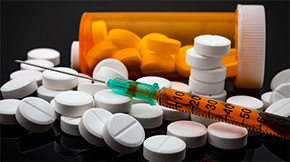Use Of Drug Database Increase Amid Opioid Fight
September 21, 2018
One of Florida’s main weapons to thwart “doctor shopping” has been expanding substantially after the passage of a tough new law aimed at addressing the continuing opioid crisis.
State officials said Thursday that more than 92,000 health-care providers had registered to use an electronic database that tracks patients who are prescribed controlled substances.
The August total is more than double the number of providers who were registered to use the system the previous year.
 Bruce Culpepper, a consultant for the Florida Department of Health, told members of the Health Information Exchange Coordinating Committee about the “major uptick in activity” in response to the new law, which, for the first time, requires doctors to consult the database before writing prescriptions.
Bruce Culpepper, a consultant for the Florida Department of Health, told members of the Health Information Exchange Coordinating Committee about the “major uptick in activity” in response to the new law, which, for the first time, requires doctors to consult the database before writing prescriptions.
The providers made 4.75 million inquiries into the database during August, said Culpepper, who coordinates the department’s health-information exchange activities.
Moreover, Culpepper said Florida has been working with neighboring Alabama and Georgia, as well as Kentucky, on integrating Florida’s prescription drug database with their programs.
The Florida Legislature gave the green light to the monitoring program in 2009. The state required pharmacists to enter information about most controlled substances the following year when the database became operational.
But it wasn’t until this year that lawmakers also required doctors to use the database to ensure that patients weren’t “doctor shopping,” or seeking prescriptions for addictive drugs from multiple physicians.
The mandate that they check the system before prescribing was one of many changes lawmakers approved to try to abate the opioid crisis.
The Legislature also banned doctors from writing prescriptions for more than three-day supplies of controlled substances. In medically necessary instances, physicians can write prescriptions for seven-day supplies. The new restrictions don’t apply to cancer patients, people who are terminally ill, palliative care patients and those who suffer from major trauma.
Prior to the mandate, just 20.6 percent of the 73,085 licensed medical doctors in the state were registered to use the prescription-drug monitoring program, according to a December 2017 annual report. The medical doctors, however, accounted for nearly one-third of the 35.8 million queries that were made to the database.
Jeff Scott, general counsel of the Florida Medical Association, said doctors initially were confused by the new mandate and whether it applied to them. Scott, who has been with the FMA for 21 years, said it’s been one of the more controversial laws the Legislature has passed in his experience with the statewide physician group.
“We were getting quite a bit of questions about it prior to it going into effect,” he said, adding that the FMA’s offices were fielding as many as 30 phone calls a day over the summer before the law took effect July 1.
Legislators acted this year to address the growing opioid problem. In 2016, for example, fentanyl caused 1,390 deaths, heroin caused 952 deaths, oxycodone caused 723 deaths, and hydrocodone caused 245 deaths, according to a House staff analysis.
Meanwhile, U.S. Surgeon General Jerome Adams on Thursday released a report that said, based on preliminary data, opioid overdoses were responsible for killing 131 Americans daily last year. In 2016, more than 115 Americans died daily from opioid overdoses.
by Christine Sexton, the News Service of Florida
Comments
2 Responses to “Use Of Drug Database Increase Amid Opioid Fight”



hmm. it it sad that weak individuals (drugheads) have made it more difficult for sick people to get the medications they need. in this day and age there is no more privacy, you are in all kinds of databases and you personal info is sold by the state to all takers.
the one guy i know (my brother) in constant back pain will not take pain medication bcuz he does not want to be doped up. his doctor appointment is a month away due to the slow process of the government.
When are the families of those whom have died from overdoses and blaming the doctors or someone else, going to accept that the person’s taking the drugs are the ones responsible for their deaths.
I’m not saying that there are no unscrupulous doctors trying to get rich but the majority are compassionate people and they can only go by what the patients tell them. If your loved ones are going to the doctor and lying in order to get the drugs they want, it is their fault and no one else.
Prohibition is only making the situation worse, now your loved ones will be forced to buy contaminated drugs like heroin that has all kinds of garbage added to it and is so variable in potency from dose to dose that it is even deadlier than if it was pharmaceutical grade.
I recommend some these finger pointers to look at the real causes of drug abuse, it could be possible they are part of the problem, but no one wants to admit their own faults when they can blame someone else.